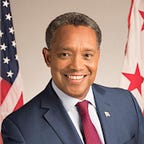Your Right to Protest: Making Your Voice Heard for Abortion Rights & Staying Safe
Last week, a leaked draft Supreme Court opinion indicated that the Supreme Court will likely overturn Roe v. Wade — a dangerous move that would take away rights and invade the personal autonomy of millions of Americans. Many of us are angry and afraid of what this decision could mean for us, our families, and our country.
For now, Roe v. Wade is still the law. The Supreme Court has not issued a final opinion. And this is a critically important time for all of us to make our voices heard about how critical strong abortion rights are for patients across the country. Click here to learn more about the impact of overturning Roe for the District.
This weekend, and in the weeks to come, thousands of DC residents and others from across the country will come together in the District of Columbia to show their collective support for reproductive rights and access to abortion care. And your voices matter.
If you are joining a protest in DC to stand up for abortion access and gender equality — or if you are protesting here for any other reason — here are some things you should know about your rights and how to stay safe:
· Everyone has the right to protest peaceably under both federal and DC laws. The right to peaceably protest and demonstrate is protected by federal law, including the First Amendment of the US Constitution, and by District law. The right to protest peaceably applies to everyone, including US citizens, legal residents, and immigrants. (Note: Check with an immigration attorney if you have questions about your specific situation. Protests may increase the likelihood of interacting with law enforcement, which could impact current or future immigration status.)
· Other private individuals may not interfere with your right to peacefully protest. Counter-protestors also have free speech rights. However, individuals may not use force, violence, or threats to limit, or attempt to limit, your right to peaceably protest. Under the District of Columbia’s Bias-Related Crimes Act, it is illegal to commit a criminal act, such as assault, to prevent someone from exercising a right, including the First Amendment right to protest, or because of someone’s real or perceived political affiliation. If this happens to you, please notify law enforcement immediately.
· You are permitted to document, photograph, and record protests and demonstrations. This means you may be photographed or recorded while attending or participating in a protest or demonstration. It also means you have the right to photograph and record law enforcement as long as it does not interfere with police activity.
· There are places in DC where the right to protest may be limited. Your right to protest is strongest in traditional “public forums,” like streets, sidewalks, and parks — but DC is a mix of local and federal land, and protections that apply may be different in different areas. For example, it is against federal law to protest on Supreme Court grounds, and protests and demonstrations on the grounds of the U.S. Capitol require a permit and are restricted to certain areas. There are also laws that limit protests at or near private residences.
· The right to protest does not protect violence or civil disobedience. The right to protest is balanced with the need to protect the safety of District residents and visitors — including protestors, counter-protesters, and bystanders. The First Amendment does not protect speech that incites violence, and it does not protect violence or civil disobedience that occurs at a protest. Acts of civil disobedience, like blocking entrances to buildings or physically stopping passers-by, are not protected forms of speech and may result in arrest.
· Open carry of firearms is illegal in the District. If you see a private individual carrying a gun, inform a law enforcement officer immediately.
· If you are arrested, you have the right to an attorney. If you are arrested, you have a constitutional right to speak to an attorney.
· Businesses may not discriminate against protestors because of their views. Protesters are generally permitted to access any public accommodations in the District, including restaurants, transit, and public bathrooms. Under DC’s Human Rights Act, access to places of public accommodations may not be restricted based on someone’s real or perceived political affiliation.
If other individuals interfere with your right to peaceably protest, or if you experience discrimination because of your political affiliation, contact our office at OAGCivilRights@dc.gov.
Let’s continue to safely stand up for our fundamental rights both here in DC and across the country.
